100篇初中生阅读题(含答案)
(精品附答案)中考复习现代文阅读分类汇编之记叙文阅读训练100篇

1、生机勃勃的太阳花(安徽省)中考语文现代文分类汇编——记叙文①一天清晨,太阳花开了,在一层滚圆的绿叶下边,闪出三朵小花。
一朵红,一朵黄,一朵淡紫色。
乍开的花儿,像彩霞那么艳丽,像宝石那么夺目。
在我们宁静的小院里,激起一阵惊喜,一片赞叹。
②三朵花是信号.号音一起,跟在后边的便一发而不可挡。
大朵、小朵,单辨、复瓣,红、紫、蓝、粉一齐开放.一块绿色的法兰绒,转眼间,变成缤纷五彩的锦缎。
连那些最不爱花的人,也经不住这美的吸引,一得空暇,就围在花圃跟前欣赏起来.③从初夏到深秋,花儿经久不衰。
一幅锦缎,始终保持着鲜艳夺目的色彩。
起初,我们认为,太阳花经久不衰,是因为太阳花喜爱阳光,特别能够经受住烈日的考验。
不错,是这样的。
在夏日暴烈的阳光下,牵牛花偃旗息鼓,美人蕉慵倦无力,富贵的牡丹也早已失去神采。
只有太阳花,阳光愈是炽热,它开得愈加艳丽,愈加旺盛.④但看得多了,才注意到,一朵太阳花,其生命却极为短促.朝开夕谢,只有一日。
因为开花的时光太短,这机会就显得格外宝贵.每天,都有一批新的花蕾在等待开放.日出前,它包裹得严严紧紧,看不出一点要开的意思,可是一见阳光,就即刻开放。
花瓣像从熟睡中苏醒过来了似的,徐徐地向外伸张,开大了,开圆了……这样一个开花的全过程,可以在人注视之下,迅速完成。
此后,它便贪婪地享受阳光,尽情地开去。
待到夕阳沉落时,花瓣儿重新收缩起来,这朵花便不再开放.第二天,迎接朝阳的将完全是另一批新的花蕾。
⑤这新陈交替多么活跃,多么生动!也许正是因为这一点,太阳花在开放的时候,朵朵都是那样精神饱满,不遗余力。
尽管一朵太阳花,生命那么短促,但整体上它们总是那样灿烂多姿,生机勃勃.⑥开完的太阳花并不消沉,并不意懒。
在完成开花之后,它们就腾出空隙,把承受阳光的最佳方位,让给新的花蕾,自己则闪在一旁,聚集精华,孕育后代,把生命延续给未来。
待到秋霜肃杀时,它们已经把银粒一般的种子,悄悄地撒进泥土。
第二年,冒出的将是不计其数的新芽.⑦太阳花的欣赏者们,似在这里发现了一个世界,一个科学的、公平的、友爱的世界。
(精品附答案)中考复习现代文阅读分类汇编之记叙文阅读训练100篇

1、生机勃勃的太阳花(安徽省)中考语文现代文分类汇编-—记叙文①一天清晨,太阳花开了,在一层滚圆的绿叶下边,闪出三朵小花.一朵红,一朵黄,一朵淡紫色.乍开的花儿,像彩霞那么艳丽,像宝石那么夺目。
在我们宁静的小院里,激起一阵惊喜,一片赞叹.②三朵花是信号。
号音一起,跟在后边的便一发而不可挡。
大朵、小朵,单辨、复瓣,红、紫、蓝、粉一齐开放.一块绿色的法兰绒,转眼间,变成缤纷五彩的锦缎。
连那些最不爱花的人,也经不住这美的吸引,一得空暇,就围在花圃跟前欣赏起来。
③从初夏到深秋,花儿经久不衰。
一幅锦缎,始终保持着鲜艳夺目的色彩.起初,我们认为,太阳花经久不衰,是因为太阳花喜爱阳光,特别能够经受住烈日的考验。
不错,是这样的。
在夏日暴烈的阳光下,牵牛花偃旗息鼓,美人蕉慵倦无力,富贵的牡丹也早已失去神采。
只有太阳花,阳光愈是炽热,它开得愈加艳丽,愈加旺盛。
④但看得多了,才注意到,一朵太阳花,其生命却极为短促。
朝开夕谢,只有一日。
因为开花的时光太短,这机会就显得格外宝贵。
每天,都有一批新的花蕾在等待开放.日出前,它包裹得严严紧紧,看不出一点要开的意思,可是一见阳光,就即刻开放。
花瓣像从熟睡中苏醒过来了似的,徐徐地向外伸张,开大了,开圆了……这样一个开花的全过程,可以在人注视之下,迅速完成.此后,它便贪婪地享受阳光,尽情地开去。
待到夕阳沉落时,花瓣儿重新收缩起来,这朵花便不再开放。
第二天,迎接朝阳的将完全是另一批新的花蕾。
⑤这新陈交替多么活跃,多么生动!也许正是因为这一点,太阳花在开放的时候,朵朵都是那样精神饱满,不遗余力。
尽管一朵太阳花,生命那么短促,但整体上它们总是那样灿烂多姿,生机勃勃.⑥开完的太阳花并不消沉,并不意懒。
在完成开花之后,它们就腾出空隙,把承受阳光的最佳方位,让给新的花蕾,自己则闪在一旁,聚集精华,孕育后代,把生命延续给未来。
待到秋霜肃杀时,它们已经把银粒一般的种子,悄悄地撒进泥土。
第二年,冒出的将是不计其数的新芽。
(完整版)100篇初中生阅读题(含答案),推荐文档

生活是什么①有个谜语:你对它笑,它就对你笑;你对它哭,它就对哭--这是什么?②人们都猜:这是镜子!我的朋友却不动声色地回了一句:这是生活。
③举座皆惊!他却来了句妙侃:“愁眉苦脸地看生活,生活肯定是愁眉不展;爽朗乐观地看生活,生活肯定阳光灿烂!”④果然有道理!⑤于是,我突地想起一个故事。
一次,穷困的法国作家拉伯雷想去巴黎,却偏偏一分钱也没有,就故意笑眯眯地当着警察的面拿出几张白纸,分别在上面写上“送给皇后的药”、“送给王子的药”、“送给公主的药”,然后在白纸里包了点红色粉末。
那警察见拉伯雷行为古怪,疑为刺客,便把他押到了巴黎,经审查排除了刺客的嫌疑,又只好把他放了--真是妙极,笑眯眯的拉伯雷一分钱没花,便平平安安地到了巴黎!⑥真佩服这位乐观豁达的拉伯雷,真佩服这种笑眯眯的人生态度!尤其有趣的是,笔者钻研法国文学时,居然找到了上述谜语的出处--就是拉伯雷说的:“生活是一面镜子,你对它笑,它就对你笑,你对它哭,它就对你哭。
”⑦不是吗?如何看待生活,的确与人的主观世界有关:心中没有阳光的人,势必难以发现阳光的灿烂!心中没有花香的人,也势必难以发现花朵的明媚!⑧既然如此,以豁达的态度面对人生吧!别小肚鸡肠!别斤斤计较!别动不动就背上沉重的十字架!1、文章开头引用谜语,有什么作用?2、第②段中“不动声色”表现了朋友什么样的性格?3、第④段中“果然有道理”,如何理解其中包含的道理?4、根据第⑤段的记叙,请用简明的话概括拉伯雷靠什么平安地到达巴黎。
5、第⑥段中拉伯雷的话与前面的谜语有何不同?说明了什么?6、模仿第⑦段中画横线的格式和修辞,补写两个句式相同的句子。
7、最后一段连用几个感叹号,有什么作用?8、读了本文,你认为生活还是什么?请运用比喻对它进行描摹。
地平线小的时候,我才从秦岭来到渭北大平原,最喜欢骑上自行车在路上无拘无束地奔驰。
庄稼收割了,又没有多少行人,空旷的原野上稀落着一些树丛和矮矮的屋。
差不多一抬头,就看见远远的地方,天和地已经不再平行。
【答案】初中语文阅读理解必备100篇
初一语文阅读理解必备100篇答案【答案】初一语文阅读理解必备100篇1.①我在姐姐的帮助下,梳着仕女发型,顶着满头菊花跑出家,惹得村人围观。
②我羡慕菊花枕,决心做一只却没做成。
③我周日逛街买回一盆黄色的菊花。
(每空1分)【概括題公式】:某人+做了某事+結果,一句话完整、簡潔、準確即可。
2.晋田园悠然见南山3.作者运用拟人、比喻的手法,生动形象地写出野菊花开放的姿态,表现它“随意又随性”,字里行间流露出作者对它的喜爱和赞美。
【賞析題公式】:作者運用了xxx表現手法,生動形象地寫出了xxx,表現了它xxx,表達了作者xxx的思想感情。
4.最后—句点明并升华了文章的主旨,黄色的菊花勾起了作者对孩提时的美好回忆和对美的追求,驱散了秋天的寒意,让心灵一片温暖,而对菊花的喜爱和赞美已不言而喻了。
【答案】初一语文阅读理解必备100篇(二)父亲希望我长大有出息,能够跳出穷山村,展翅飞翔;“我”却因为名字的缘故,不能和小伙伴们一起玩儿,感到孤独。
(2分)2.在接到大学录取通知书的那天,“我”为自己终于可以脱离父亲的管制,实现不想见到他的梦想而哭;对父亲大办酒席时的高兴劲儿,不屑一顾;在冲出家门的时候,也不顾及父亲的黯然神伤;在省城念书的前两年,没有回过一次家,没有认真给父亲写过一封信。
(4分,每个要点1分)3.既写出了父亲对“我”就要离开家乡时恋恋不舍的心理活动,也表现了父亲对“我”独立生活担心的心理活动。
(2分)4.一开始写“我”对父亲的迷信举动嗤之以鼻,甚至愤然;当读到父亲竟然能够写出“我”的名字的时候,“我”的灵魂被深深地灼痛了,苏醒了;“我”从父亲的这个举动中感受到了父亲那份沉重的爱,并开始“忏悔”自己。
(2分,答出一点给1分)5.对父爱的不理解,对自己多年来对父亲的不尊敬和仇恨表示忏悔。
(2分)【答案】初一语文阅读理解必备100篇(三)1.(1)神山赶庙会时先是只顾脱模子,后在看摔跤时一直挎着一篮脱好的模子未放下。
初中语文阅读理解练习题及答案
初中语文阅读理解练习题及答案初中语文阅读理解练习题及答案「篇一」邻居阿麻①我与邻居阿麻结怨已经很久了,瞧他那副样子,够你烦心:脸麻,腿跛,背驼。
因为这副尊容,他已经四十多岁了还是个“快乐的单身汉”。
②单身汉有空闲,管闲事管到了我的头上。
我和我的伙伴们在玩的方面个都是天才。
下雪天,我们拆别人的篱笆学大人烧炭,他提起一桶水,“噗”的一声,将炭窑冲得稀烂:“烧了镇上的房屋,你们去坐牢?”秋天,我们有土炸药炸别人家菜园的南瓜,炸得“瓜肉横飞”,我们高兴得直翻跟斗。
正当得意忘形之时,阿麻的手钳住我:“看我不告诉你们爷娘!”回家后,我们都挨到一顿打,皮肉受苦,奇痛难忍。
我们奈何不了阿麻,只能编歌谣泄恨:“麻子麻叮当,骑马上洪江,听到锣鼓响,麻子脸上痒。
”这时,阿麻便要追击,我们“哗”的`一声跑散,望着他一跛一跛的样子,我们开心得像喝了“可口可乐”。
③我们不喜欢他,小镇上的大人们也不怎么喜欢他。
这中间有个缘故。
④小镇的西边有一条河,是学生上学和大人外出的必经之路,河上有座年久失修的桥,桥上桥板朽了,常常跌倒人;木桥墩烂了,走在上面摇摇晃晃像荡秋千。
www.终于,一场大雨,猛然的山溪水将它冲走,还带走了我的一个好伙伴春山。
我庆幸那天贪玩旷课,拣得了一条小命。
阿麻请人做了个小木船,干起了摆渡的行当。
第一天过渡免费,镇里的人都说他在积德。
可是,第二天收费1角,后来竟然涨价到了4角。
阿麻“发”了,腰包胀鼓鼓,有人骂他“黑良心,赚昧心钱”,但他默默地忍受了。
⑤风里来,雨里去。
阿麻摆渡六年,操劳过度,脸色蜡黄,日渐消瘦。
人们担心,他总有一天会栽倒在小河里。
⑥后来,小河上砌起了一座石拱桥,小巧玲珑,像一把小金锁,锁住了放荡不羁的小河。
从此,小镇的人们过河如履平地,都说修桥人泽被后世。
⑦小桥落成的前两天,阿麻死了。
医生说他患的是癌症。
⑧小桥落成那天,正逢小镇赶集,人山人海,好不热闹。
桥上没有彩灯,没有横幅,没有红绸。
一挂20xx响,响过以后,镇长讲话了:“今天,我们在这里举行小桥落成典礼暨阿麻同志追悼会。
100篇初中生阅读题(含答案)之欧阳地创编
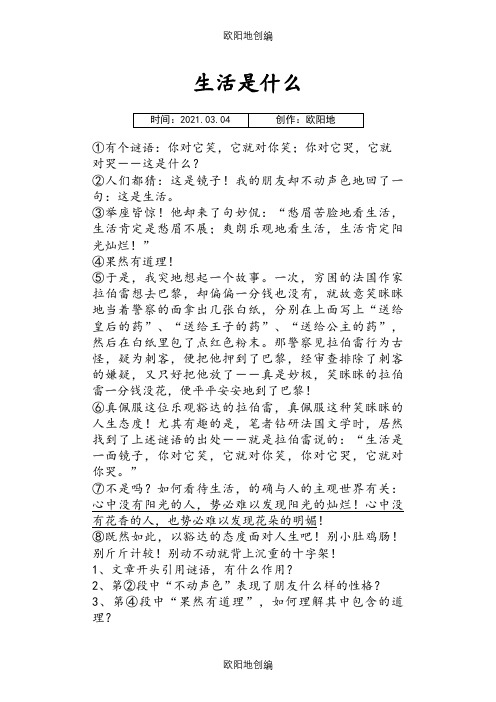
生活是什么①有个谜语:你对它笑,它就对你笑;你对它哭,它就对哭--这是什么?②人们都猜:这是镜子!我的朋友却不动声色地回了一句:这是生活。
③举座皆惊!他却来了句妙侃:“愁眉苦脸地看生活,生活肯定是愁眉不展;爽朗乐观地看生活,生活肯定阳光灿烂!”④果然有道理!⑤于是,我突地想起一个故事。
一次,穷困的法国作家拉伯雷想去巴黎,却偏偏一分钱也没有,就故意笑眯眯地当着警察的面拿出几张白纸,分别在上面写上“送给皇后的药”、“送给王子的药”、“送给公主的药”,然后在白纸里包了点红色粉末。
那警察见拉伯雷行为古怪,疑为刺客,便把他押到了巴黎,经审查排除了刺客的嫌疑,又只好把他放了--真是妙极,笑眯眯的拉伯雷一分钱没花,便平平安安地到了巴黎!⑥真佩服这位乐观豁达的拉伯雷,真佩服这种笑眯眯的人生态度!尤其有趣的是,笔者钻研法国文学时,居然找到了上述谜语的出处--就是拉伯雷说的:“生活是一面镜子,你对它笑,它就对你笑,你对它哭,它就对你哭。
”⑦不是吗?如何看待生活,的确与人的主观世界有关:心中没有阳光的人,势必难以发现阳光的灿烂!心中没有花香的人,也势必难以发现花朵的明媚!⑧既然如此,以豁达的态度面对人生吧!别小肚鸡肠!别斤斤计较!别动不动就背上沉重的十字架!1、文章开头引用谜语,有什么作用?2、第②段中“不动声色”表现了朋友什么样的性格?3、第④段中“果然有道理”,如何理解其中包含的道理?4、根据第⑤段的记叙,请用简明的话概括拉伯雷靠什么平安地到达巴黎。
5、第⑥段中拉伯雷的话与前面的谜语有何不同?说明了什么?6、模仿第⑦段中画横线的格式和修辞,补写两个句式相同的句子。
7、最后一段连用几个感叹号,有什么作用?8、读了本文,你认为生活还是什么?请运用比喻对它进行描摹。
地平线小的时候,我才从秦岭来到渭北大平原,最喜欢骑上自行车在路上无拘无束地奔驰。
庄稼收割了,又没有多少行人,空旷的原野上稀落着一些树丛和矮矮的屋。
差不多一抬头,就看见远远的地方,天和地已经不再平行。
精选中考阅读理解100篇附答案
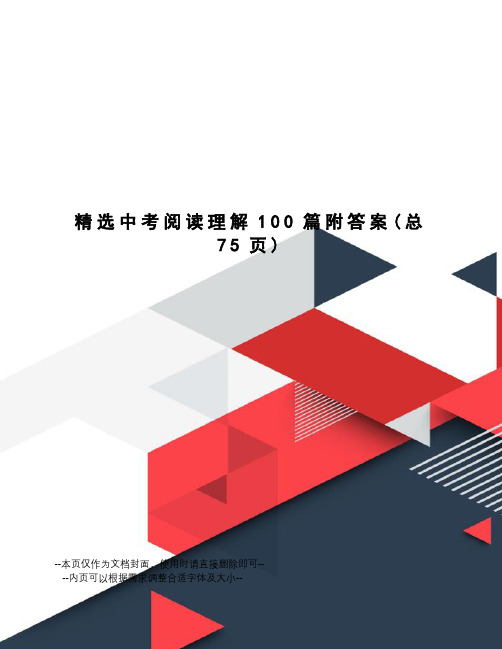
精选中考阅读理解100篇附答案(总75页)--本页仅作为文档封面,使用时请直接删除即可----内页可以根据需求调整合适字体及大小--精选中考阅读理解100篇附答案1-20(1) The Weather (选自广州)In winter the weather in England is often very cold. In spring and autumn there are sometimes cold days, but there are also days whenthe weather is warm. The weather is usually warm in summer. It issometimes hot in summer, but it is not often very hot. There areoften cool days in summer.When the temperature is over 27℃, English people say it is hot. When the temperature is about 21℃, they say it is warm.In the north of Europe it is very cold in winter. In the south of Europe the summer is often very hot. In the south of Spain(1) andin North Africa(2) the summer is always hot.Water freezes(3) at 0℃. When water freezes, it changes from a liquid (4) into ice. Water boils(5) at 100℃. When water boils, itchanges from a liquid into steam(6).Notes: (1)Spain/speIn/n. 西班牙(2)Africa/`frIk/n.非洲(3)freeze/fri:z/v.结冰(4)liquid/`lIkwId/n.液体(5)boil/bIl/v.沸腾;(水)开(6)steam/sti:m/ n.蒸汽is the weather like in summer in Englandhot. . . A and C.do you think “the north of Europe" means?part of a country. capital of Europe.country in the north of Europe.part of Europe.water freezes, it changes from into ., ice , steam, ice , waterwriter wants to tell us something about .weather in Europe weather in Englandknowledge of the temperatureD. three states of water答案:1—4 DDAC(2) The Artist and the Beggar(1)(选自成都)An artist was coming home by train one day. He hadn’t much money but was very kind. He gave his last few coins(2) to a beggar, but hesaw another one, and forgot that he didn’t have any money in hispockets. He asked the man if he liked to have lunch with him, andthe beggar, of course, agreed. So they went into a small restaurantand had a good meal.In the end, the artist could not pay the bill(3), and the beggar had to do so. The artist felt very sorry for it, so he said to thebeggar, “Come home with me in a taxi, my friend. And I’ll giveyou the money for our lunch."“Oh, no!" the beggar answered quickly. “I had to pay for your lunch, but I’m not going to pay for your taxi home!"Notes: (1)beggar/`beg/ n.乞丐(2)coin/kIn/n. 硬币(3)bill /bIl/n.帐单kind of man was the artist?did he do to the first beggar?did the artist forget when he invited another beggar to have lunchwith him?paid for the meal?did the artist want to do at last?didn’t the beggar go home with the artist?答案:artist is a kind man.gave his last few coins to the first beggar.forgot that he had no money then.beggar paid for the bill.wanted to return the beggar the money when he got home.he wouldn’t pay for the taxi.(3) A Common Language (选自陇南)There is a common(1) language popular in every country in the world.All the people, old and young, men and women, must use it.It’s everybody’s second language. It’s easy to learn, though(2)you don’t hear it. It’s sign language(3).When you wave to a friend, you are using sign language. When you smile at someone, you mean to be friendly. When you put up your hand inclass, you are saying, “Please ask me. I know the correct answer."When you put your finger in front of your mouth, you mean “Bequiet." The deaf use sign language to talk to each other. There iseven a university for the deaf in the United States. There are alsoTV programmes for the deaf people. They use sign language to telleverybody.Notes: (1)common/`kmn/adj. 共同的(2)though/u/ conj. 尽管(3)sign language 手势语(4)wave/weIv/ v. 挥手uses sign language.language is not d , so we can learn it.people who can s use sign language, too.someone smiles at you, it means he/she is friendly t you.you can a a question, you should put up your hand first.put your finger in front of your mouth if you want someone not to s anything.deaf can talk to each other w sign language.A deaf people can learn sign language in the university.答案:(4) Tom Broke a Plate or a Gold Watch? (选自辽宁)It was Sunday and Tom was staying at home. After breakfast he went out into the garden and played quietly by himself. There were no kidsaround and he was used to(1)playing alone quietly. He playedwith Bobby, the dog. He climbed up and down the tree. Sometimes abird would come down to perch(2) on top of the doghouse. Then Tomwould have the greatest fun(3) by throwing a stone or somethingat it. Though he never made it, he did like doing this kind ofthing.Now Tom had been in the garden for half an hour. Suddenly a crack(4)was heard and the little boy began crying.“What’s the matter,Tom"his mother looked through the kitchen(5)window. Tom ran into the kitchen.“Mum," he sobbed(6). "I broke Bobby’s plate. I didn’t know it was so fragile(7)."His mother put her arms round him and said, “Don’t feel so sad, Tom.We have other plates for Bobby. But how did you break that one"“I threw it at a bird but missed, and it went straight to the plate."In Tom’s hand was his father’s gold pocket watch(8)!Notes: (1)be used to 习惯于(2)perch/p:t/n. 停歇(3)fun/fn/n. 爱好(4)crack /crk/n. 破碎声(5)kitchen/`kItn/n. 厨房(6)sob/sb/v. 抽泣(7)fragile/`frdaIl/adj. 易碎的(8)gold pocketwatch 金怀表did the story happen?a Sunday afternoon. a Sunday morning.noon. the evening.a bird perched on top of the doghouse,Tom .like to play with itvery interested in it by throwing a stone at itlike to give it something to eatsmilewere no kids around and he was used to playing alone quietly. Here“kids"means .long had Tom been in the garden when his mother heard him cry?hour. day. hours. an hour.5.“Though he never made it" means“".he couldn’t hit a bird with a stone or somethi nghe couldn’t catch the birdhe couldn’t have fun from the birdhe couldn’t eat the bird答案:1—5 BBCDA(5) EatingAn important question about eating out is who pays for the meal. If a friend of yours asks you to have lunch with him, you may saysomething like this,“I’m afraid it’ll have to be someplace cheap,as I have very little money." The other person may say,“O K, I’llmeet you at McDonald’s."This means that the two agree to go Dutch, that is, each person pays for himself. He may also say,“Oh, no. I want to take you to lunchat Smith’s," or“I want you to try the Chinese dumplings there.They’re great." This means the person wants to pay for both of you.If you feel friendly towards this person, you can go with him andyou needn’t pay for the meal. You may just say,“Thank you. Thatwould be very nice."American customs(1) about who pays for dates(2) are much the same as in other parts of the world. In the old days, American womenwanted men to pay for all the meals. But, today, a university(3)girl or a woman in business world will usually pay her way duringthe day. If a man asks her for a dance outside the working hours,it means “Come, as my guest(4).” So as you can see, it is apolite thing to make the question clear at the very beginning.Notes:(1)custom/`kstm/n. 风俗(2)date/deIt/n.约会(3)university/、ju:nI`v:sItI/n. 大学(4)guest/gest/n. 客人passage tells us .to eat out to eat outto eat out pays for the mealyou have little money, .’ll have a cheap meal ’ll borr ow some from others’ll ask your friend to pay for your mealwon’t want your friends to ask you to dinner3.“Go Dutch" in this passage means .A.去饭馆B.就餐C.订餐D.各自付款your friend takes you to lunch. It means .’s going to lend some money to yo u’s going to pay for your meal, too’ll be angry with youcan’t understand youAmerica,some girls and women now.men to pay for their mealsto pay for the men’s mealsto pay for their own mealshave anything outside答案:1—5 DADBC阅读理解(6)Most children like watching ’s very (1) watching TV they can see and learn a lot and know many things about their country and thecourse,they can also learn over the they can learn better and moreeasily with Because they can hear and watch at the same theycan’t see anything over the radio.TV helps to open children’s helps to open their minds(2), learn newer and better ways of doing may find the world is now smallerthan before.Many children watch TV only on Saturday or Sunday are always busy with their a few children watch TV every go to bed very can’t have agood about you,my young friends?Notes:(1)by/baI/prep.通过(2)minds/maIndz/n.智力few children go to bed late because they .busy with their lessons their homeworkTV to the radiocan’t see anything .the radio the radioTV watching TVhelps to open children’s .and mindsor minds4. children watch TV only on Saturday or Sunday evening.lot C. A lot of littlecan study better and more easily with TV because .like to watch TV can hear at the same timecan watch at the same timecan listen to and see something at the same time参考答案:阅读理解(7)John was ten years old and he was very lazy[1].He had to go to school,of course,but he was bored[2]there and tried to do as littlework as father and mother were both doctors and they hoped that hewould become one,too,when he grew one day John said to hismother,“W hen I finish school, I want to become a garbagecollector[3].”“A garbage collector?”his mother asked .She was very surprised.“That’s not a pleasant do you want to become a garbagecollector?”“Because then I’d only have to work one day a week,”John answered.“Only one day a week?”his mother said,“What do you mean?”“Well,”John answered,“I know that the ones who come to our house only work on Wednesday,because I only saw them on that day.”Notes:[1]lazy/leIzI/adj.懒的 [2]bored/bd/adj.厌烦 [3]garbage collector 垃圾工at school.’t do any work much workvery little work to finish his work’s parents wanted him to become .garbage collector doctorteacher workerhoped to be a garbage collector because .knew it was an important and necessary jobthought he would work only one day a weekoften saw some garbage collectors come to his housegarbage collectors really work only one day a weekthought that the garbage collectors only work one day a week because .was a rule garbage collectors told him soparents told him sosaw them work only on Wednesday参考答案:阅读理解(8)Bill and Fred studied at a university and they were friends. They didn’t have much money, so when it was time for their holidays,Fred said, “Let’s take our holidays in a trailer[1], Bill. It’scheaper than a hotel. I can borrow my father’s trailer.”Fred was very happy. So they got into the trailer and began their holidays. They wanted to get up early the next day to go fishing,but they didn’t have an alarm[1] clock.“That’s all right, Bill," Fred said. “I’ll put these pieces of bread on the roof[3] of the trailer tonight and they’ll wake us upin the morning." Bill was very surprised, but he didn’t sayanything.Fred was right. As soon as it began to get light, small birds came down to eat the bread, and their noise on the roof of the trailer wokeBill and Fred up very quickly.Notes:[1]trailer/`treIl/ n. 活动房屋式的拖车 [2]alarm/`la:m/ n. 警报alarm clock 闹钟 [3]roof/ru:f/ n. 顶;房顶and Fred were both university s .two young men decided to go t during their summer holidays.two young men tried to s some money,so they borrowed a trailer.two young men wanted to get up, but they were a to wake up too late the next morning.had a good i .didn’t know w his friend put some bread on the top of thetrailer.next morning, the birds found the bread and flew to e it.fact, the b woke the two young men up.birds began to look for f as soon as it got light.was very c .参考答案:阅读理解(9)Some children think writers are great and they can tell people a lot.So they also wish to be writers some day. They mean that they wantto write stories or books which many persons will read. I wouldlike to remind[1] them that they will need to be good readers andto read a lot in order to[2] be good writers.Nearly all great writers read too long before they started to school, and read for hours and hours every day since they became goodreaders. Instead of watching TV in the evening, they spend much oftheir spare[3] time reading books.If you are a good reader, it won’t take you long to do the reading homework your teacher asks you to do. Then you will have time toread other books for fun. Because you read so well, you keeplooking for more books to read.While making up your mind[4] to become a good writer, you had better say to yourself,“I must read more and more if I am really tobecome a good writer."Notes:[1]remind/rI`maInd/v. 提醒 [2]in order to 为了 [3]spare /spe/adj.多余的 [4]make up one’s mind 下决心of the children like the g writers.writer told the children to read m before they hope to be writers.lot of writers l a lot from other writers' books and stories.a student, he or she should do the reading homework well f .much good reading can h you to be a good writer.参考答案:阅读理解(10)Australia is one of the greatest islands in the is a little smaller than is in the south of the when there is hot summer in ourcountry,it is cold winter in Australia.Australia is big,but the population[1] has population of Australia is the same as that of Shanghai,a city in China.Australia is famous for its sheep and kangaroos[2].After a short drive from any town,you will find yourself in the middle of whitesheep,sheep,sheep,everywhere are you seen a kangaroo?It has a“bag”in its mother kangaroo keeps its baby kangaroo in the“bag”.It is very interesting,isn’t it?Notes:[1]population /、ppjuleIn/n.人口 [2]kangaros /、kg`ru:/n.袋鼠根据短文内容判断正(√)、误(×)。
100篇初中生阅读题(含答案)之欧阳家百创编
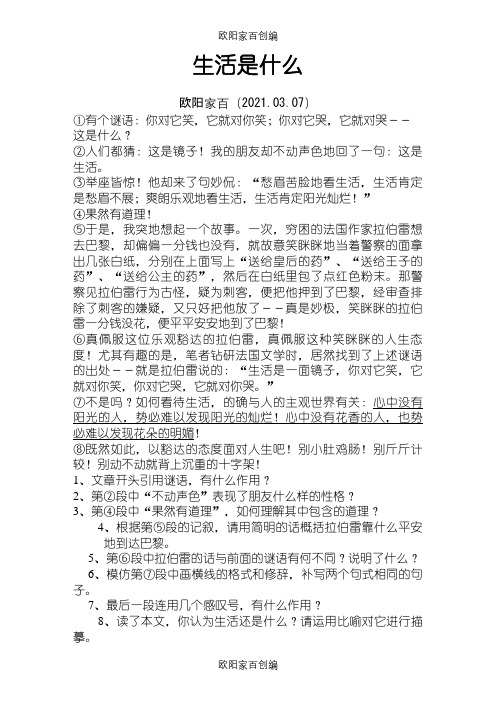
生活是什么欧阳家百(2021.03.07)①有个谜语:你对它笑,它就对你笑;你对它哭,它就对哭--这是什么?②人们都猜:这是镜子!我的朋友却不动声色地回了一句:这是生活。
③举座皆惊!他却来了句妙侃:“愁眉苦脸地看生活,生活肯定是愁眉不展;爽朗乐观地看生活,生活肯定阳光灿烂!”④果然有道理!⑤于是,我突地想起一个故事。
一次,穷困的法国作家拉伯雷想去巴黎,却偏偏一分钱也没有,就故意笑眯眯地当着警察的面拿出几张白纸,分别在上面写上“送给皇后的药”、“送给王子的药”、“送给公主的药”,然后在白纸里包了点红色粉末。
那警察见拉伯雷行为古怪,疑为刺客,便把他押到了巴黎,经审查排除了刺客的嫌疑,又只好把他放了--真是妙极,笑眯眯的拉伯雷一分钱没花,便平平安安地到了巴黎!⑥真佩服这位乐观豁达的拉伯雷,真佩服这种笑眯眯的人生态度!尤其有趣的是,笔者钻研法国文学时,居然找到了上述谜语的出处--就是拉伯雷说的:“生活是一面镜子,你对它笑,它就对你笑,你对它哭,它就对你哭。
”⑦不是吗?如何看待生活,的确与人的主观世界有关:心中没有阳光的人,势必难以发现阳光的灿烂!心中没有花香的人,也势必难以发现花朵的明媚!⑧既然如此,以豁达的态度面对人生吧!别小肚鸡肠!别斤斤计较!别动不动就背上沉重的十字架!1、文章开头引用谜语,有什么作用?2、第②段中“不动声色”表现了朋友什么样的性格?3、第④段中“果然有道理”,如何理解其中包含的道理?4、根据第⑤段的记叙,请用简明的话概括拉伯雷靠什么平安地到达巴黎。
5、第⑥段中拉伯雷的话与前面的谜语有何不同?说明了什么?6、模仿第⑦段中画横线的格式和修辞,补写两个句式相同的句子。
7、最后一段连用几个感叹号,有什么作用?8、读了本文,你认为生活还是什么?请运用比喻对它进行描摹。
地平线小的时候,我才从秦岭来到渭北大平原,最喜欢骑上自行车在路上无拘无束地奔驰。
庄稼收割了,又没有多少行人,空旷的原野上稀落着一些树丛和矮矮的屋。
